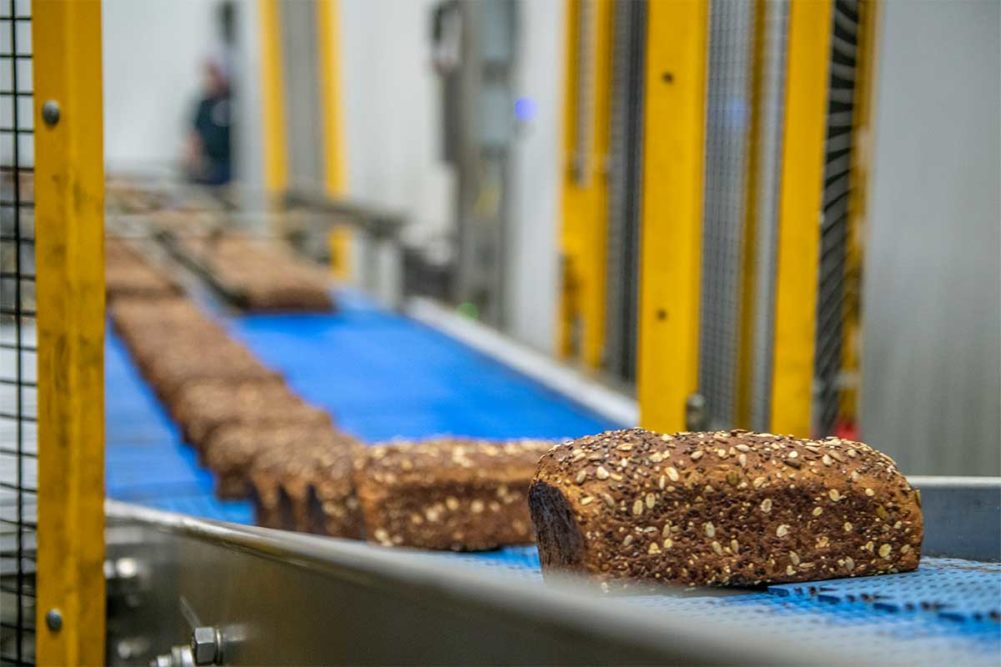The original Dave’s Killer Bread (DKB) bakery in Milwaukie, Ore., began with a more manual process of baking than a typical Flowers Foods, Thomasville, Ga., operation. Most transfers were done manually, and product was baked in rack ovens. Since the acquisition, the bakery has been upgraded with automation in moulding and panning. Migrating away from co-manufacturers to bring DKB production into Flowers’ operations has enabled the company to automate the process further.
“With each DKB facility we have added, we have incorporated more automation to improve speed and efficiency and to make the process less labor intensive,” said Robert Benton, executive vice president of network optimization for Flowers Foods. “We have gone from actually panning by hand to the use of robotics in our newest facility in Henderson, Nev., and we have virtually doubled the throughput while remaining true to the process and formulation and maintaining the highest possible quality.”
Going from manual transfers in Milwaukie to robots in Henderson, however, took time and lots of learning along the way to maintain the high quality DKB’s loyal consumers expect of the “universe’s best bread.” From Milwaukie, Flowers added production in its Mesa, Ariz., facility, which was already organic when Flowers acquired Alpine Valley Bread, which also produced organic baked goods. In Mesa, Flowers replaced rack ovens with an indirect gas-fired, single-lap oven to speed up the baking process. After Mesa, Flowers added DKB production to Tuscaloosa, Ala., where Mr. Benton said the company added horizontal tilt-bowl mixers, the first conveyorized proofer and improved the cooling process, one of the biggest hurdles with a loaf of DKB.
“We knew we needed more cooling time and more airflow,” he said.
Cooling is the final step in ensuring a consistent loaf of bread is sent to the packaging department. That consistency is critical to eliminating waste, and with the amount of pricey ingredients packed in each loaf of bread, Flowers is always trying to reduce as much waste as possible. On top of that, DKB bread is dense, and cooling it to the appropriate temperature takes time. While Tuscaloosa was the first time Flowers incorporated spiral coolers, the company took spiral cooling to the next level in Lynchburg.
“DKB bread is very high in absorption, and in order to be able to properly slice and bag the product, extra attention was paid to the dehumidification of the air that is used in the cooling process,” said Rich Luciano, general manager, Lynchburg Organic Baking Co. “We also improved the environment of the bakery for the employee as well as the product.”
In Lynchburg, the cooler box houses two spiral coolers that bread from the oven travels up and down before heading to be sliced and bagged. Moist hot air is removed from the box, then cooled and dehumidified before being recirculated into the system. This technology has given Flowers an incredible amount of control over the cooling process, a benefit in Virginia where the bakery experiences the temperature fluctuations that come with four seasons.
“The wrapper would have to constantly adapt to changes in the temperature of the bread if there was inconsistency, but we don’t have to do that here because the product is always the same temperature,” Mr. Luciano explained.
At Lynchburg, Flowers has introduced automation to its minor ingredient handling for the first time. Not only has this improved scaling accuracy, but it has also enhanced the dough quality all while reducing costs, which is critical for DKB because it is packed full of seeds and made with only organic ingredients. Flowers worked with Higgins Electric to develop the batching system. Mr. Benton anticipates that the benefits this system has brought to DKB will justify using it in future bakeries.
“The first thing we saw when we put in this system was the consistency of the doughs just leveled out,” Mr. Benton said. “When you have a human being scaling these ingredients, they may make mistakes. The minors are really expensive ingredients, but they are also really active ingredients. You can’t make mistakes with those ingredients.”
This article is an excerpt from the August 2022 issue of Baking & Snack. To read the entire feature on Flowers Foods/DKB, click here.





